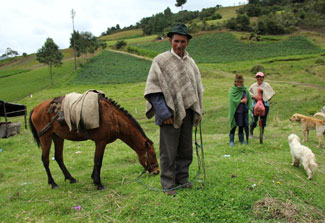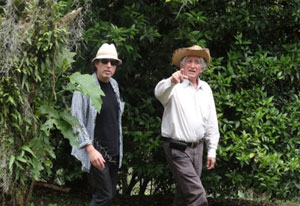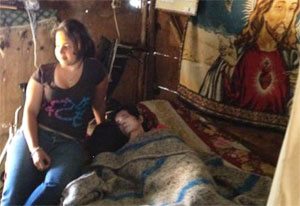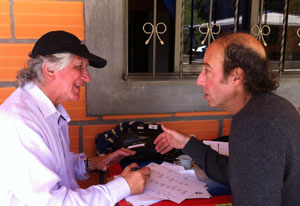Fogarty-supported researchers spur Alzheimer's research in Colombia
January / February 2014 | Volume 13, Issue 1

Photo by Daniel Triviño/Photoshare
Researchers supported by Fogarty's brain disorders program
are collaborating to study an heritable variant of early-onset
Alzheimer's disease in Colombia.
By Arthur Allen
Dr. Francisco Lopera was a resident in neurology when the first patient with dementia walked into the San Vicente de Paul hospital in Medellin, Colombia in 1984. "He was 47 years old and he had completely lost his memory over the past three or four years," Lopera recalled. "What was truly remarkable was, exactly the same thing had happened to his father and grandfather at the same age."
Over the next several years Lopera visited the man's family, where he identified several other cases with the same complex of symptoms. He eventually found more patients in nine other mountain villages, as well as in Medellin itself. The families even had a name for the ailment: la bobera, "the idiocy."
"I didn't have an investigative program at first," Lopera recalled. "On the weekends, more out of curiosity than anything else, I went up to the towns and talked to the old people and reconstructed the history of dementia there." This wasn't easy, in the midst of the drug wars, but Lopera persevered. Now, with the Medellin area more peaceful than it has been in decades, his work is reaching an important stage. The patients he has examined for the past three decades finally are getting a chance to participate in the trial of a therapy that might help them.
Nearly all of the cases of this heritable variant of early-onset Alzheimer's disease share a common ancestor. He was a 16th-century Spanish colonist who carried a particularly devastating genetic mutation to Antioquia province, where it spread through isolated villages. To date, Lopera and his colleagues have identified 5,000 patients in 25 families with the mutation.
The area is a mountainous, intensely green region of deep ravines, forests and coffee plantations, ravaged by guerrilla warfare for decades. The conflict sent many gene carriers into the shantytowns in the hills around Medellin, while others stayed behind in the mountains. In 1991, after Lopera, chief of the neurosciences program at the University of Antioquia, published a case study of this "founder" cohort, Dr. Kenneth Kosik of Harvard got in contact. They began a collaboration that, with assistance from Fogarty's brain disorders program, has turned what Kosik calls the "natural laboratory" of Antioquia into a leading center for the study of Alzheimer's disease.
"In this population, we know who's going to get it and we know when," says Kosik, now Harriman Professor of Neuroscience at the University of California, Santa Barbara. "The gene does its nasty work like a clock."

Photo courtesy of Dr. Kenneth Kosik/UCSB
Fogarty has supported an Alzheimer's research
collaboration between Dr. Kenneth Kosik (left) and
Colombian scientist Dr. Francisco Lopera.
The Lopera-Kosik collaboration, funded by Fogarty and the National Institute on Aging (NIA) since 2004, has taken on added significance in the last few years because of the unique characteristics of the Antioquia population, by far the world's largest occurrence of early-onset familial Alzheimer's.
Most Alzheimer's researchers believe that beta-amyloid protein accumulations in the brain cause the disease. But trials of drugs designed to attack amyloid in sick patients have in recent years failed to slow or reverse its symptoms. Lopera, a co-director of the Colombian trial, is hopeful that these same drugs might be more successful if given to patients before they develop disease symptoms, by preventing the accumulation of the dangerous protein.
The Antioquia cohort presents a unique opportunity to study this hypothesis, because the carriers of the presenilin-1 mutation always develop early-onset disease. No such large, asymptomatic-yet-doomed group of Alzheimer's patients exists anywhere else in the world.
Lopera, Kosik and other researchers have begun administering Genentech's drug crenezumab to symptom-free carriers of the mutation in the presenilin-1 gene. The five-year, $100 million trial, funded by Genentech, the NIA and the Banner Institute in Phoenix, is the first of its kind: its aim is to determine whether a drug designed to combat Alzheimer's can prevent it from developing in the first place.

Photo courtesy of Dr. Kenneth Kosik/UCSB
Researchers are testing a drug to see if it prevents
Alzheimer's in a Colombian family with a genetic
mutation for the disease.
The double-blind trial involves 300 patients: 100 asymptomatic carriers will receive the drug, 100 other carriers will get a placebo, as will 100 non-carriers in the same age group. The brains of all patients will be examined using PET scans to detect beta-amyloid. The scientists hope the brain images of those receiving the drug will not show deterioration and the subjects will retain their mental fitness.
If the drug has no effect, says Lopera, the result will also be important, because it may clarify that Alzheimer's research needs to focus on a target other than beta-amyloid. All of this has been clearly explained to the patients, he said, who can use the information to decide whether to participate.
Dr. Patricia Cardona-Gomez, a professor of cellular and molecular neurobiology at the University of Antioquia and co-PI with Kosik on many studies, trained at the University of Iowa and UCSB's Neuroscience Institute, supported by a Fogarty grant. Fogarty assistance enabled the University of Antioquia neuroscience department to create a vivarium where rodent models of Alzheimer's have been studied and housed.
Their research in mice is a long way from any human application, says Cardona-Gomez. Still, employing such cutting-edge work helps put the university's neurology department in the mainstream of advanced Alzheimer's research. Several other Antioquia postdocs, Ph.D. and master's candidates have benefitted from training supported by these grants, and two are currently working in Kosik's lab.
The partnership and the many years of Lopera's work in the region have created a degree of trust among researchers and patients that Kosik and Lopera describe as almost unique.

Photo courtesy of Dr. Kenneth Kosik/UCSB
The partnership between Colombian scientist
Dr. Francisco Lopera (left) and Dr. Kenneth Kosik
has created a degree of trust among researchers
and patients.
Kosik attributes much of what has been accomplished in Antioquia to Lopera's "tireless work" doing science, building relations and providing social services to affected families. "He will spend hours and days and weeks going from village to village to collect stories and histories, do neurological exams and make all this happen," says Kosik, who also praises Fogarty's role.
"Fogarty has made an enormous contribution," he says, because by strengthening local capacity it enabled a powerful platform for collaboration between foreign and local scientists. "I can't emphasize how much that is the key to success of this project. We are not just going down there, taking genes, publishing papers and ignoring the people," Kosik said. "The Colombian researchers are not just collecting samples, they are thinking and designing experiments at the same level as we are."
This relationship and its benefits will carry beyond Alzheimer's research, Kosik says, because the region contains a "treasure trove" of genetic disorders that require careful study. These include the fatal neurological disease Huntington's, and an inherited disorder that causes young people to suffer strokes.
Alzheimer's currently afflicts about 5 million Americans, a number expected to triple by 2050. It costs $170 billion to treat each year. Around the world, the estimated 37 million cases of the disease will expand to 115 million by 2050, according to the Alzheimer's Association.
Cardona-Gomez occasionally meets with patients and relatives in the presenilin-1 cohort, and their plight motivates her. "I feel impotent when I hear some of these stories, but it's also like a motor that helps me focus more and more on how these problems can be resolved. Not by me, perhaps, but maybe by one of my students."
Adds Lopera, "Our patients in Antioquia have participated in various studies for almost three decades. They are family to us. They have seen many relatives die of the disease, and they understand that it's incurable. They are very hopeful about this drug trial, and we also have hopes, but it may do absolutely nothing. Yet even in the worst-case scenario, this information will be important for the future."
Fogarty's Brain Disorders in the Developing World: Research across the Lifespan program is designed to increase research capacity in low-resource countries and help improve neurological health for millions around the globe.
More Information
To view Adobe PDF files,
download current, free accessible plug-ins from Adobe's website.